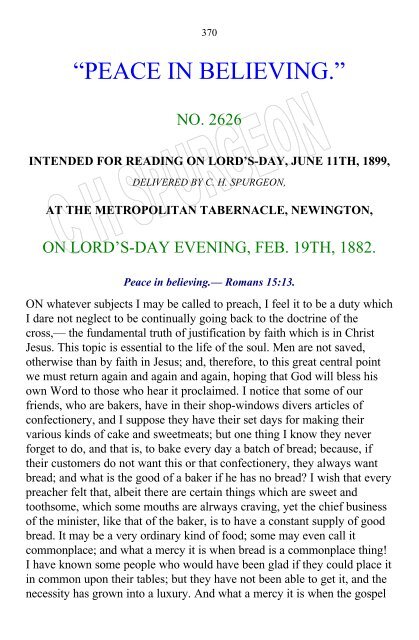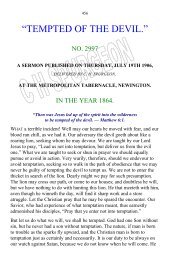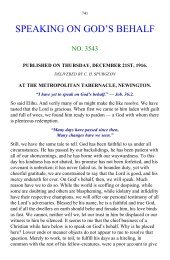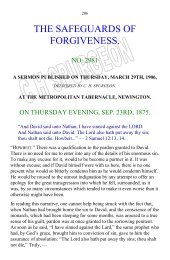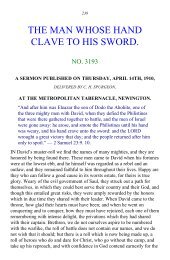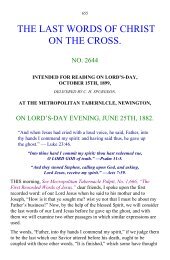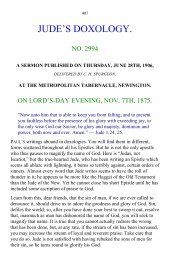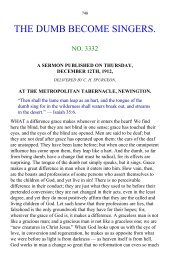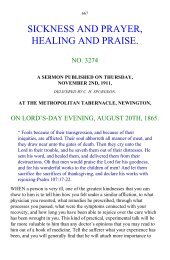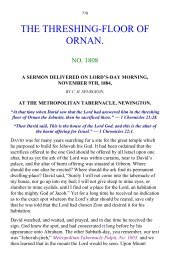Spurgeon's Sermon 2626 Peace In Believing Romans ... - Apibs.info
Spurgeon's Sermon 2626 Peace In Believing Romans ... - Apibs.info
Spurgeon's Sermon 2626 Peace In Believing Romans ... - Apibs.info
You also want an ePaper? Increase the reach of your titles
YUMPU automatically turns print PDFs into web optimized ePapers that Google loves.
370“PEACE IN BELIEVING.”NO. <strong>2626</strong>INTENDED FOR READING ON LORD’S-DAY, JUNE 11TH, 1899,DELIVERED BY C. H. SPURGEON,AT THE METROPOLITAN TABERNACLE, NEWINGTON,ON LORD’S-DAY EVENING, FEB. 19TH, 1882.<strong>Peace</strong> in believing.— <strong>Romans</strong> 15:13.ON whatever subjects I may be called to preach, I feel it to be a duty whichI dare not neglect to be continually going back to the doctrine of thecross,— the fundamental truth of justification by faith which is in ChristJesus. This topic is essential to the life of the soul. Men are not saved,otherwise than by faith in Jesus; and, therefore, to this great central pointwe must return again and again and again, hoping that God will bless hisown Word to those who hear it proclaimed. I notice that some of ourfriends, who are bakers, have in their shop-windows divers articles ofconfectionery, and I suppose they have their set days for making theirvarious kinds of cake and sweetmeats; but one thing I know they neverforget to do, and that is, to bake every day a batch of bread; because, iftheir customers do not want this or that confectionery, they always wantbread; and what is the good of a baker if he has no bread? I wish that everypreacher felt that, albeit there are certain things which are sweet andtoothsome, which some mouths are alrways craving, yet the chief businessof the minister, like that of the baker, is to have a constant supply of goodbread. It may be a very ordinary kind of food; some may even call itcommonplace; and what a mercy it is when bread is a commonplace thing!I have known some people who would have been glad if they could place itin common upon their tables; but they have not been able to get it, and thenecessity has grown into a luxury. And what a mercy it is when the gospel
371is a commonplace thing,— when you have so much of it that you reallyunderstand, it, and enjoy it, and feed upon it! It is then as it ought alwaysto be with the true ministry of the gospel. So, preacher, whatsoever thoudost choose to neglect, never neglect to preach Christ crucified, and thesimple, soul-saving precept, “Look and live.” What if there be someprophetic passages which thou canst not understand? The day shall declarethem. What if there be certain deep doctrines that are too profound forthee? Thou and thy people shall learn them in eternity, if you learn themnot in time. But as for this doctrine, that “he that believeth on the Son hatheverlasting life,” it must be learned now or never; and if it be not learnednow, men will be shut out of heaven eternally. Therefore, let this truth beproclaimed again and again and again. Let it still be preached, even thoughsome who have itching ears weary of it, for there is an urgent necessity thatit should be made known whether men will hear or whether they willforbear. Better that the sun should not rise than that Christ should not bepreached. Better that the wheels of time should stand still than that thename of Jesus should not be sounded forth. Better that the dews bewithheld, and the rain fall not again upon the earth, than that the gloriousgospel of the blessed God be hidden from the sons of men.So, then, this is my reason for coming to you again, as I have come somany hundreds of times before, with the same old message, “Believe andlive.” I am comforted by the persuasion that all who are saved by believingare the most ready to hear this story over and over again. It is not what Ido not know so much as what I do Jhow that I delight to hear, and manyothers are of the same opinion as I am in that matter. It is a curious phaseof human nature, but it is true. You may talk to a congregation aboutdiscoveries in the center of Africa, and yet you may lose the attention ofyour hearers; but if you speak about the village, or hamlet, or street inwhich one of them was born or lived, he will prick up his ears at once. Thevery thing that he knows best is that which, somehow, holds his attentionmost. So have I often seen it in the highest affairs; they who understand thegospel best are the readiest to hear of it again and yet again. If I were totake Luther on the Galatians, intending to give it as a present to someonewho would be sure to appreciate it, I should not bestow it upon a man whowas not a believer in Jesus, or give it to one who did not understand thedoctrine of salvation by faith; but I should hand it over to the man who haslong believed in Christ, and found rest in him; for I should be certain that
372the strong and racy utterances of the great Reformer would be appreciatedby him. They love the gospel most who know it best.Another thing comforts me, too, namely, that in such a congregation as thisthere are always some persons who are just ready to believe. I throw thefly with confidence because there are always fish rising to it. God isploughing the hearts of many, and so preparing the soul for the good seedof the kingdom. Little children die; aged mothers are carried away; there issickness in the body; or loss in the business, or suffering of variouskinds,— all this is the passing of God’s great plough up and down thesefurrows; and when I scatter the good seed, I know that the furrows aregaping for it, they are hungry for it, so they gladly receive it. Here aremany of those who are ordained unto eternal life to whom the truthconcerning “peace in believing” comes as the very message of God to theirsoul, the good news that they are most glad to hear. So they receive it, andgo on their way rejoicing. Doubtless, there are some hearers of that kindhere now; oh, that we may very soon hear of their conversion, for it wouldgladden our heart to have such good tidings. Therefore, by the help ofGod, let us at once get to our work.I. And, first, having to talk about faith, and one of its sweet results,— forour subject is that faith brings peace to the soul,”peace in believing”; — thefirst head shall be, that IT IS A FILLING PEACE.<strong>In</strong> the verse from which our text is taken, the apostle says, “Now the Godof hope fill you with all joy and peace in believing,” so that the peace whicharises from faith is a filling peace. There is, in the heart of an awakenedman, a great vacuum caused by sin. He is like some of those great artificialharbours which I have seen, in various places, out of which they sometimesallow all the water to run, and there remains a dreary expanse of mud.What is the use of it? What is needed in order to make it of service oncemore? Why, simply that the tide should come into it, and fill it, and coverup all that mud. As I look on some of you, dear friends, I know that yourheart is just like that great harbour full of mire. What is to be done for you?What is to be done with you? Well, the grace of God can come in, andcover all your transgressions and your iniquities, till they shall never bementioned against you any more for ever. What a blessed peace that iswhich diets the conscience, — which takes away the sense of guiltiness,and puts, in the stead of it, consciousness of perfect pardon, of
373justification, and of acceptance before God. This is “peace in believing.” Itfills the vacuum that sin has made.Then this divine flood, when it has covered that part of our distress, flowsin over our sinfulness as well as our sins, for, in addition to our actualtransgression, there is the defilement of our nature; and when a man isawakened, it is a cause of moaning and unrest to him that he not only hassin, but that he is sin,— that his very nature is a fountain of evil, containingmuch that is adverse to God, and in alienation from him. But, by believing,there flows into the heart a flood of life which removes our death,— apurifying stream which takes away our corruption, and we have peace withGod, for “we which have believed do enter into rest” about that matter,too; and though we sometimes have to cry, “O wretched man that I am!who shall deliver me from the body of this death?” yet we “thank God,through Jesus Christ our Lord,” that we are delivered from the dominion ofsin, and that we shall, by-and-by, be deliverers from the very existence ofit, and shall be like unto God in purity and true holiness. That is, indeed, ablessed peace,— a peace that comes of a changed nature, of a renewed.heart, and of reconciliation to God.You will tell me that those blessings are enough to fill a man with peace;and, truly, I think they are. But as, when the tide comes in, it not only rollsup the main stream of the Thames, but it flows also into every creek, andfills every tiny streamlet, so is it with the grace of God. There is a blackstream that sometimes runs into the river of a man’s life, and makes itturbid; that is, the fear of death. But, oh! I have seen the great flood ofeternal life come rolling up, and drive the black stream back, till all waspure, and all was quiet and, calm, Is it not so with the man who believes inJesus? He loses the fear of death. Sometimes, instead of fearing it, healmost longs for it. As Mr. Flavel, when living in sweetest communion withChrist, said, “I never saw a face more beautiful than that of death when Isaw the light from the face of Christ fall on it; then I longed to die muchmore than to live.” And good Dr. Watts sang,—Oh, if ray Lord would come and meet,My soul should stretch her wings in haste,Fly fearless through death’s iron gate,Nor feel the terrors as she pass’d.Yes, this “peace in believing” will fill your soul so as to drown the fear ofdeath.
374Perhaps another says, “The fear of life is that which is upon me, the fear ofthe troubles incident to my condition, and my position among my fellowmen,the fear which arises out of those three questions, ‘What shall we eat?What shall we drink? And wherewithal shall we be clothed?’” Beloved, thepeace which comes through believing will put these fears away, and fillyour soul with perfect rest concerning them. <strong>In</strong>deed, these things will seemto you to be only trifles after which the Gentiles seek, and you will scorn tobe troubled by them, for you will remember that “your Heavenly Fatherknoweth that ye have need of all these things,” and he will supply yourneed in his own good time and way.Then, sometimes, will come upon us, to break our peace, the cravings ofdesire. A man is never perfectly at peace if he is ambitious, and craving forthis or that which as yet is beyond his reach. “<strong>Peace</strong> in believing” makes ussay of Christ, “He is all my salvation and all my desire.” He loves us toknow that all things are ours; and, therefore, that there is nothing left in theregion of desire, for—All things are ours; the gift of God,The purchase of a Savior’s blood;While the good Spirit shows us howTo use and to improve them too.Oh, what a blessed, blessed rest it is when a man’s desires are satisfied withthe favor of God!One very natural cause of disturbance of mind is solicitude about ourfamilies, —anxiety as to how we shall bring them up in the fear of God,earnest longing that they may become believers in Christ, honorableChristian men and women; but faith learns to bear even this without havingher peace broken, for she pleads the promise, “Unto you, and to yourchildren, and to all that are afar off, even as many as the Lord our Godshall call.” Faith falls back upon the inspired Word: “But the mercy of theLord is from everlasting to everlasting upon them that fear him, and hisrighteousness unto children’s children; to such as keep his covenant, and tothose that remember his commandments to do them.” I know of no causeof disquietude which faith will not remove. I know of no ground-swelldisturbing the mind which faith cannot quiet. I know of nothing in earth, inheaven, in hell, in time, in eternity, in life, in death, which is not fully metby the covenant blessings which are within reach of faith, and which faithlearns to appropriate. This “peace in believing” is a sea that has no bottom
375nor shore; it is a peace of intense restfulness; oh, that we were all plungedin it this very hour!II. Now, very briefly, let me remind you that, according to the text, IT ISFAITH PEACE that is such a filling peace as I have tried to describe.I may be addressing some persons who are wanting to find peace for theirsouls, but they have never sought faith’s peace. There is a false peace thatcome get,— the peace of carelessness; they do not even think abouteternity. They “count it one of the wisest things to drive dull care away.”They scarcely think of what will happen even a month ahead, but they saythat they are content to live by the day. This is the way in which the manprotects himself when, after the thief has broken into his house, he coversup his head, and lies in bed, and thinks that he himself and his propertymust be safe, because he cannot hear the burglar at work. This is the kindof philosophy of men who, when they are ready to fail in business, shut uptheir books, and never take stock because they would be so disturbed ifthey knew their real condition. It is a beggarly, cowardly kind of peace thatis fit for fools and madmen, but is not fit for you who are reasonable,responsible beings. Oh, I would scorn to have a peace in my heart whichconsisted in shutting my eyes! The truth ought to befaced; and, the moredangerous the truth, the more urgently does it call upon us to look at it;and he is the wise man who can stand before the truth that frightens mostmen, and, having looked it in the face, can say, “Now I am not afraid; I am,rather, the more established in my conviction of my safety, now that I haveseen that which would have destroyed me if it had not been for faith inChrist.” Shun, I pray you, the safety which is but in appearance, and doesbut thinly film the deadly ulcer that needs to be eradicated from yourframe.Some others seek a peace which comes of hardihood. They not merelyshut their eyes, but they lie against the truth. “The fool hath said in hisheart, There is no God,” and, he gets peace out of that foolish and falsedeclaration. Men deny the immortality of the soul; they deny the Divinity ofChrist; they deny the inspiration of the Bible; and so they think that theyshall sew pillows together that shall make it easy for their heads to rest. Letthose do this who dare; but, as for some of you, you cannot do it, for youknow too much, and you have felt too much, ever to be self-deceived insuch a fashion as that. Can he ever be an infidel who has seen his motherdie joyfully triumphant? Is it possible for me, for instance, to find a shelter
376from my sins by denying that there is any hereafter, when I have stood bythe bedside of saints, and seen their ecstasy, and have heard the strangethings, scarcely lawful for a man to utter, which they have told concerningthat which is within the veil? Some of us are spoiled for infidelity, for wehave had familiar intercourse with the Eternal; we have spoken with him,“as a man speaketh with his friend;” and, henceforth, this escape fromthought avails us not. Thank God that it does not avail us, for the abhorredof the Lord fall into this deep ditch; and how seldom do they come up outof it! May God grant that we may never need to tell a lie, and violate ourconscience, in order to give it peace! That is not the rest of faith which Icommend to you.Some have tried to get peace from self-confidence. They think they are asgood as others, if not rather better. As they see those who are mereprofessors of religion, they thank God that they are not professors ofreligion, for they are not hypocritical, and therefore they do not pretend tobe what they are not. Yet there is often a worm at the root of that proudboasting; and, in your sober moments, you who talk in this fashion do notthink thus of yourselves. You are not insane; and you know that you arenot doing that which is pleasing to God, or living to his glory. Selfrighteousnessis sometimes a delusion, but it generally begins by a man’sattempting to delude himself But there is no real peace to be obtained byany works that we can perform, or by the pretense that we have performedworks which are meritorious in the sight of God. There is no promise ofpeace to come in this fashion.But, peradventure, you have patched up your self-righteousness with a fewornaments stolen from the Church of God. Were you, as an infant,“baptized” and made “a member of Christ, a child of God, and an inheritorof the kingdom of heaven”? Have you been confirmed, and taken the“sacrament”— as it is wrongly called; and is there not much efficacy inthat? Sirs, listen to me: there is nothing in it! There is nothing whatsoeverin it, unless you have first believed in the Lord Jesus Christ. Or, if there beanything in it, you have participated in ordinances to which you had noright. for these things are only for believers, and if you have not believed inJesus, you are intruders into his Church, and you have stolen from his altarthat which he reserves for his own people, and little advantage will this beto you. Beware of trusting in your church-going, or your chapel-going, oryour Tabernacle-going. Beware of trusting in your prayers, or your Biblereading,in your hymns and holy thoughts and almsgivings. They are all
377lighter than vanity; and as chaff from the fan of the winnower, shall they beblown away. There is no peace in them though you multiply them as thesand upon the sea-shore. Our text speaks of “peace in believing,” and thereis no peace worthy of the name that is to be found in any other way.III. But now, thirdly, this “peace in believing” is A WELL-FOUNDEDPEACE; for what is it?It is, first, a peace which is the result of believing the word of God, whocannot lie. God, the ever-blessed Father, says, “Hearken to me; I havegiven my well-beloved Son to be a Savior to you. Trust in him, and youshall be saved.” I trust in him, and I am saved. How do I know that? Why,because God said so; and God cannot lie! Is there any better foundation forpeace in this world than the Worl of God? What God has spoken, must betrue. “Let God be true, and every man a liar;” and I, believing what he hassaid, have a right to all the peace that can come out of that sure Wordwhich I have believed.Remember, too, that this Word of God comes to us by the inspiration ofthe Holy Spirit. If you do not believe that Book to be inspired, I havenothing to say to you just now; but most of us do believe that every part ofit is “God-breathed.” Well, then, knowing that Book to be the infallibleWord of God, if we get peace through believing what is in that Book, wehave sure ground to stand upon. Either the Book is a lie, or else our faith isfully warranted, and our peace is perfectly justified. Oh, what a blessedthing it is to feel that you have Scripture at your back! Many saints that Ihave read of have asked, when dying, to have their angers laid upon someprecious promise of the Word, and they have thus witnessed to theirconviction that the passage was the very truth of God to their souls. Onesaid, “Guide me to that glorious eighth of <strong>Romans</strong>.” Another had his fingerlaid upon this text, “Him that cometh to me I will in no wise cast out;” andanother on this verse, “Yea, though I walk through the valley of theshadow of death, I will fear no evil: for thou art with me, thy rod and thystaff they comfort me.” You know how you take one another’s word, and,trust to it; and when you get a note of hand in black and white from a goodtradesman, you do not mistrust it; then, shall we ever mistrust the blackand white of God,— the record of his dear Son which he has given us inHoly Scripture? No; nor will we mistrust the peace that comes into ourheart through believing it.
378And then, my brethren, mark also that our peace is founded on God’stestimony concerning his Son. He tells us, in this Book, that the Onlybegotten took upon him human form, and came down among men,that,being here, he lived the life of a servant, and, at the last, taking upon himman’s sin, and as the Substitute for guilty men, he went up to the cross,and there bore his Father’s wrath, dying in the place of the guilty, “the Justfor the unjust, that he might bring us to God.” I recollect how I graspedthat truth when I first understood it; it was that doctrine of substitutionwhich brought peace to my troubled spirit. I saw that, if Christ died for me,then I should not die; and that, if he paid my debt, it was paid, and I wasclear; and I knew that this was the case as soon as I believed in him. So Idid believe in him, and I was filled with “peace in believing.” And that“peace in believing” meets every need of the heart. Are you troubled? “Allthings work together for good to them that love God.” Are you afraid thatyou shall fall? Rest content about that also, for “he will keep the feet of hissaints.” Are you afraid that you shall ultimately perish? Has he not said,“My sheep hear my voice, and I know them, and they follow me: and I giveunto them eternal life; and they shall never perish, neither shall any manpluck them out of my hand”?Our faith is, indeed, well-founded, and can be abundantly justified. Faith inChrist is nothing but common sense sanctified. of God. It may be commonsense to trust some banker who has long maintained his credit, and not tobe always worrying about whether he is solvent or not; but it is infinitelygreater common sense to trust God,— to trust his Son,— to trust hisSpirit,— to trust his Word. If you do trust these, you shall enjoy acalmness of spirit which will not be the effect of a mistaken confidence, butthe result of the most glorious facts, — a peace which may be questionedand cross-questioned, examined and cross-examined, but the answer it shallgive to all enquiries must be satisfactory. Faith’s building may be searched,and tried, and tested, from foundation to topstone; but no flaw shall befound in any part of it. It is a good, and wise, and true, and just, and properthing to trust the Lord Jesus Christ, and so to have “peace in believing.”IV. I have done when I have just noticed one more point, namely, that Ibelieve this “peace in believing” to be A MOST FRUITFUL PEACE.I wish you all knew it; for, first, it makes even this world a better and ahappier place. It takes the sting out of all troubles to have “peace withGod through our Lord Jesus Christ.” There is no man who is so ready to
379cope with the troubles of life as the one who knows that all is right foreternity. Some of you often get worried in your daily calling, and when youcome home from business, you cannot rest. When you go to bed, youcannot sleep, for there is within you a fear of death, and of a dreadedsomething after that. But suppose that a man can say, “That matter is allsettled”,—‘Tis done! the great transaction’s done:I am my Lord’s, and he is mine;—“I have trusted myself with Christ, and I know that he is able to keep thatwhich I have committed unto him against that day;” he goes to his businessfeeling that he has a burden off his shoulders,the great burden he had solong carried,— and he is ready for anybody, and ready for anything. If youset a man to run up a hill, and lay heavy weights on his back, he must makeslow work of it. Take off those weights, and now see him. Why, he turnsinto a gazelle; and he leaps from crag to crag when the burden is gone. Ah!dear friends, if you were relieved of your burdens, your very office workwould grow lighter; your bargaining would be more wisely done; youwould be the better able to deal with your fellow-men when you had cometo your proper position before God, and all was made right there.This peace with God is fruitful in the growth of all other graces. Have youa garden? If so, have you some fruit trees in it? Do you dig them up everyyear? Do you take them out of the ground two or three times in a season,and carry them about the garden, and then plant them in a fresh spot? If so,I would not give you a penny for all your fruit; but when you plant yourtree in good. soil, and it is well watered and manured, when the fruitbearingseason comes, there is your fruit. It is a, blessed thing to got thevery roots of your being entwined around. Christ; now you can grow, nowyou can bring forth fruit. Now you will get patience; now you will gethope; now you will get love; soon you will get full assurance; you will havethe work of sanctification going on; you will be more and moreconsecrated and devoted to Christ, and you will become “strong in theLord, and in the power of his might.” God give you “peace in believing,”that you may grow in every other grace!And this, I know, will help you to serve others. A man who is enjoying theblessings of true religion, living in it, and living on it, wants other people toknow about it, and to share it with him. I think that nobody would give arecommondation to a new kind of food which he did not like himself, and
380which did him no good. He would say, “Well, if this is intended to keep mefrom being ill, I would rather be ill than eat it; and I certainly shall notrecommend it to others.” But he that has eaten it, and loves the flavour ofit, and finds that nourishment comes from it, says to his friend, “You aregetting emaciated, and thin, and debilitated, as I was; you should try what Ihave tried.” He is sure to commend it because it has done so much for him;and when we enjoy the gospel, we are sure to recommend it to others.God’s happy people are God’s working people. Those who fear andtremble, and never have any joy in the Lord, are generally a barrengeneration; but they who delight themselves in the Lord are sure to speakof him to others, and to bring others to Christ.Lastly, I believe that “peace in believing” is one of the bestinstrumentalities for bringing others to Christ. If you are soon to be veryhappy in a time of trial,— if you are known to be very patient in greatpain,— and especially if the Lord helps you to be triumphant in the solemnarticle of death,— you will be a soul-winner. Those who come round yourbed will never forget the joyous look on your face; it will be a life-longsermon to them. I do not advise you to sit up like Addison, and make ashow of it, and say, “Come; see how a Christian can die.” No, that is astyle of thing I do not admire; but when you can honestly,straightforwardly, without any parade, sweetly fall asleep in Jesus Christ,triumphantly entering into the glory, and let those around you hear yourshout of victory as you enter in to be “for ever with the Lord,” — if youcan do that, the memorial of it will abide, and those who were unconvincedbefore are most likely to be decided, while those who never hesitated willbe more than ever confirmed in the faith.<strong>In</strong> fine, to gather up all in a word, you who have no peace may have it evennow. Believe; that is, trust. Trust Jesus with your souls, and you shall have“peace in believing.” And you who have it, though it is somewhat broken,may have it to the full. Where you obtained your first peace, you can getmore. Where peace has only trickled in, it can come pouring in, it can rushin, like a heavenly deluge, and flood your entire nature, to the praise andglory of your gracious God.. May he make it to be so, for our Lord JesusChrist’s sake! Amen.
381EXPOSITIONROMANS 8:14-39.Verse 14. For as many as are led by the Spirit of God, they are the sons ofGod.Leading implies following; and those who are enabled to follow theguidance of the Divine Spirit are most assuredly children of God, for theLord ever leads his own children. If, then, you are following the lead ofGod’s Spirit, you have one of the evidences of sonship.15. For ye have not received the spirit of bondage again to fear; but yehave received the Spirit of adoption, whereby we cry, Abba, Father.The spirit of bondage is the spirit of servants, not of sons; but thatservitude is ended for us who are made free in Christ Jesus. We are nolonger afraid of being called the children of God. We are not afraid of ourown Father; we have a filial fear of him, but it is so mixed with love thatthere is no torment in it. Whether Jew or Gentile, we cry, “Abba, Father.”16. The Spirit itself beareth witness with our spirit, that we are thechildren of God:Our spirit knows that we are God’s children and then God’s Spirit adds histestimony to the witness of our spirit that we are the children of God.17. And if children, then heirs; heirs of God, and joint-heirs with Christ;if so be that we suffer with him, that we map be also glorified together.This would not necessarily be true of any man’s family, for he might havechildren who were not his heirs; but, in God’s family, all who are born intoit are born “heirs of God, and joint-heirs with Christ.” We must take ourpart of Christ’s portion,— his portion here, and his portion hereafter; therule for us who are in him shall be, “share and share alike.” He himself hassaid, “Where I am, there shall also my servant be;” and all that he has hewill divide with us. Are you willing, dear brother, to take shares withChrist? If not, then I question whether you can be rightly reckoned amonghis saints.18. For I reckon that the sufferings of this present time are not worthy tobe compared with the glory which shall be revealed in us.
382“Light afflictions” are contrasted with “an exceeding weight of glory.”Temporary afflictions, but for a moment, are to be followed by everlastingcrowns that fade not away. What a contrast!19. For the earnest expectation of the creature waiteth for themanifestation of the sons of God.All creation is, as it were, watching and waiting on tip-toe for the day whenGod shall manifest his sons who are at present hidden. <strong>In</strong> due time, theyshall come forth, acknowledged of God, and then shall the whole creationrejoice.20-23. For the creature was made subject to vanity, not willingly, but byreason of him who hath subjected the same in hope, because the creatureitself also shall be delivered from the bondage of corruption into theglorious liberty of the children of God. For we know that the wholecreation groaneth and travaileth in pain together until now. And not onlythey, but ourselves also, which have the firstfruits of the Spirit, even weourselves groan within ourselves, waiting for the adoption, to wit, theredemption of our body.We have already obtained salvation for our souls, but our body is stillunder bondage,— subject to weariness,— to pain,— to infirmity,— todeath; but, by-and-by, with the new creation, our newly-moulded bodiesshall be fit to live in the new world, and fit for our newborn souls toinhabit. This is the full redemption for which we are waiting.24-28. For we are saved by hope: but hope that is seen is not hope: forwhat a man seeth, why doth he yet hope for? But if we hope for that we seenot, then do we with patience wait for it. Likewise the Spirit also helpethour infirmities: for we know not what we should pray for as we ought: butthe Spirit itself maketh intercession for us with groanings which cannot beuttered.. And he that searcheth the hearts knoweth what is the mind of theSpirit, because he maketh intercession for the saints according to the villof God. And ave know that all things work together for good to them thatlove God, to them who are the called according to his purpose.“We know that all things work together for good.” That is a wonderfullypositive statement, Paul. There are certain persons, nowadays, who saythat we know nothing; yet the apostles constantly say, “We know this,”and “We know that.” These people tell us that there is a great distinctionbetween believing and knowing,— but, evidently, it is a distinction of
383which the inspired apostles knew nothing at all. Read the Epistles of John,and note how he continually says, “We know, we know, we know,” andhow frequently he adds, “We believe,” as though believing and knowingwere the same thing. Agnostics may declare that they know nothing, if theyplease; but, as for us who do know, because we believe what we are taughtof God in this Book, we will speak He who has something to say has sright to say it; we know, and therefore we speak.Mark, brethren, how the apostle speaks here; he does not say that all thingsshall work together for good; no, but that they do work together,they arenow working for your present good. This is not merely something whichshall eventually turn out right; it is all right now, “We know that all thingsare working together for good to them that love God, to them who are thecalled according to his purpose.” No sooner does the apostle mention thatword “purpose” than he must needs found a long discourse upon it. Hewas not afraid or ashamed to speak of the purposes of God. There aresome preachers who say nothing about God’s purpose, or God’s decree;they seem to be afraid of it, they say it is “Calvinistic doctrine.” Why, itwas here, in the Scriptures, long before Calvin was born, so what righthave they to call it by his name? Listen to what the apostle has to say:29, 30. For whom he did foreknow, he also did predestinate to beconformed, to the image of his Son, that he might be the firstborn amongmany brethren. Moreover whom he did predestinate, them he also called:and whom he called, them he also justified: and whom he justified, themhe also glorified.There is no separating these golden links of love and mercy. Thatforeknowledge, to which all things future are open and present, begins thedeed of love. Predestination comes in, and chooses a people for God whoshall be eternally his. Upon this, in due time, follows effectual calling, bywhich the chosen ones are brought out, from the impure mass of mankind,and set apart unto God. Then follows justication by faith, through theprecious blood and righteousness of Jesus Christ; and where this is, glorywill certainly come, for “whom he justified, them he also glorified.”31, 32. What shall we then say to these things? If God be for us, who canbe against us? He that spared not his own Son, but delivered him up for usall, how shall he not with him also freely give us all things ?
384Notice, it is not simply “freely give us all things;” but, “with him also freelygive us all things.” You shall get all things with Christ; but you shall getnothing without Christ, for all the other gifts come in this one. God erstgave us his Son; and he gives us everything in him.33. Who shall lay any thing to the charge of God’s elect? It is God thatjustifieth.Ring out the challenge in heaven itself; trumpet it through all the caverns ofhell; let the whole universe hear it: “Who shall lay any thing to the chargeof God’s elect ?” None can, for “it is God that justifieth,” and hisjustification blocks every charge that is brought against his people.34. Who is he that condemneth ?Who shall the Lord’s elect condemn?‘Tis God that justices their souls;And mercy like s mighty stream,O’er all their sins divinely rolls.None will answer to that challenge, for34, 35. It is Christ that died, yea rather, that is risen again, who is even atthe right hand of God, who also maketh intercession for us. Who shallseparate us from the love of Christ ?Oh, this blessed question — this touching question! It seems to come at theend of all the others,— a rear-guard which effectually prevents oartreasures from being taken from us. “Quis separabit?” “Who shall separateus from the love of Christ?”35. Shall tribulation ?That has been tried. Have not the saints been beaten like wheat upon thethreshing-floor? Has not addiction been to them a stern test of the reality oftheir faith? But Christ has loved them none the less for all the suffering thathe has permitted to fall upon them.35. Or distress, or persecution, or famine, or nakedness, or peril, orsword?When they have been in famine or poverty, has Christ ever forsaken hissaints? Ah, no! he has loved them all the more. Have any of these thingsseparated us from our Savior? No; but they have, to oar own
385consciousness, knitted us even more closely to our Divine Lord. Cruel menhave tried every form of persecuting the saints of God; they have beenmore inventive in the torments which they have applied to Christianse thanin almost anything else; yet no torture, no rack, no imprisonment, has everdivided them from Christ. They have clung to him still, after the manner ofJohn Bunyan, who, when they said, that he might go free if he wouldpromise not to preach the gospel, said, “I will lie in prison till the mossgrows on my eyelids rather than I will ever make such a promise as that. Ifyou let me out of prison to-day, I will preach to-morrow, by the grace ofGod.”36. As it is written, For thy sake we are killed all the day long; we areaccounted as sheep for the slaughter.But there has been no triumph over the saints in this case.37-39. Nay, in all these thine we are more than conquerors through himthat loved us. For I am persuaded, that neither death, nor life, nor angels,nor principalities, nor powers, nor things present, nor things to come, norheight, nor depth, nor any other creature, shall be able to separate usfrom the love of God, which is in Christ Jesus our Lord.Not all that men on earth can do,Nor powers on high, nor powers below,Shall cause his mercy to remove,Or wean our hearts from Christ our love.Glory be unto his holy name! Amen.HYMNS FROM “OUR OWN HYMN BOOK”— 23 (VERSION I.),708, 775.


